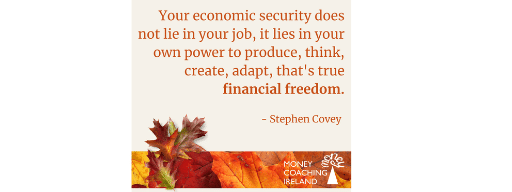The Intrinsic Nature of Financial Well-Being
October 01 2020
Read on to find out why now, more than ever we must support our financial well-being from within and how we can go about doing this. Reading time 3 minutes.

There are many different definitions of financial well-being. How I like to describe it is feeling secure and having freedom of choice when it comes to money. This definition is very much aligned to the work of the US Consumer Financial Protection Bureau (CFPB) who have thoroughly researched and provide some wonderful tools when it comes to supporting our financial well-being.
Financial security means you are not stressed about being able to meet daily or month-to-month expenses and you have the capacity to absorb a financial shock. Financial freedom of choice means you can make choices that allow you to enjoy life now and in the future.
We live in a world of unprecedented and accelerated change. Whilst this statement and its associated acronym VUCA (volatile, uncertain, chaotic, ambivalent) have become somewhat of a cliché, it is nonetheless, impossible to deny. This change can bring many opportunities but it can also impact negatively on our financial well-being. Many employers can no longer provide the financial security they once did. The cost of living has increased and our lifestyle expectations are greater. This means that many jobs no longer provide the income we require to live the lifestyle we desire.
The increasing frequency of crises causing market shocks and recessions is exacerbating the threat to our financial well-being. Although good returns may still be achieved over time, supplementing your wages or salary with investment income is not as low-risk or straight-forward as it may once have been. In short, we can no longer expect to get our financial security and freedom of choice purely from external sources. It needs to first and foremost come from within.
So how do we cultivate our internal sense of security and freedom when it comes to money? Firstly, we must acknowledge and accept the current state of our relationship with money – the good, the bad and the ugly.
Once we accept our current financial situation, it frees up energy from fighting against what is to focus on creating the financial situation we want. We can then turn our attention to optimising our income and ensuring that we are consciously spending on life’s necessities as well as things that bring us joy.

Optimising our income means identifying ways of boosting our income whilst still remaining true to our purpose and values. This may include investing surplus funds but firstly we need to ensure that we are well informed and comfortable about the risks we are taking on.
Consciously spending means identifying and eliminating unnecessary expenditure that is not serving us. This spending may be born out of apathy, time pressures or lack motivation (we are using the purchase to fulfil some lack within us).
In the case of apathetic or lazy spending, we don’t bother to see if there is a better option to satisfy the same need or want.
Spending motivated by lack means that we are compensating for something such as ‘I need new clothes because I don’t look or feel good enough; I need a new gadget because I'm lonely or bored; 'I need a new car to impress my neighbours’. These purchases, particularly if accompanied by feelings of guilt that we couldn’t really afford the item in the first place, will bring only fleeting joy.
To optimise how we earn and spend money, it helps to have a vision for the type of life we want to lead. This will make it easier to postpone certain purchases until we are more financially secure to be able to afford them.
So it’s not that you bury your dreams or desires and simply tell yourself “I can’t afford it”. If it is something you truly want, you can change your mantra from “I can’t afford it” to “How can I afford it?” as advocated by Robert Kiyosaki in his personal finance book ‘Rich Dad, Poor Dad’ and then work towards obtaining it.
And maybe an expensive car is part of that vision but if it is, it will be because you love cars, they bring you joy (growth motivation) and not because you want to rub your neighbour’s nose in it (lack motivation).
At Money Coaching Ireland, our aim is to heal and improve your relationship with money to give you financial security and freedom that stays with you for a lifetime no matter what external financial shock (redundancy, investment loss, debt crisis) you may be experiencing or come to experience in the future.
Whilst external shocks may well shake our financial well-being; if our sense of security and freedom is internally driven, then we will bounce-back and be able to deal more effectively with whatever comes our way.
If you want to support your financial well-being by bringing more ease to how you *USE** money, get in contact to see how Money Coaching Ireland can help.
*understand, spend and earn
Important Information about Money Coaching Ireland’s BLOG
The material contained in these blog posts is intended for educational and entertainment purposes only. No responsibility is taken by Money Coaching Ireland for actions taken or not taken by individuals as a result of reading/watching/listening to these posts. Money Coaching Ireland recommends that individuals seek professional advice prior to making any significant financial decisions.
Subscribe to our mailing list
We would love to keep in touch by sending quarterly newsletters, monthly money tips and occasional updates about promotions and events we may be running. We will never sell or lease your details and you may unsubscribe at any time. You can find out about how we store and protect your information in our Privacy Policy.
By signing-up to receive updates you agree with the storage and handling of your data by Money Coaching Ireland and its trusted service providers. Read our Privacy Policy.